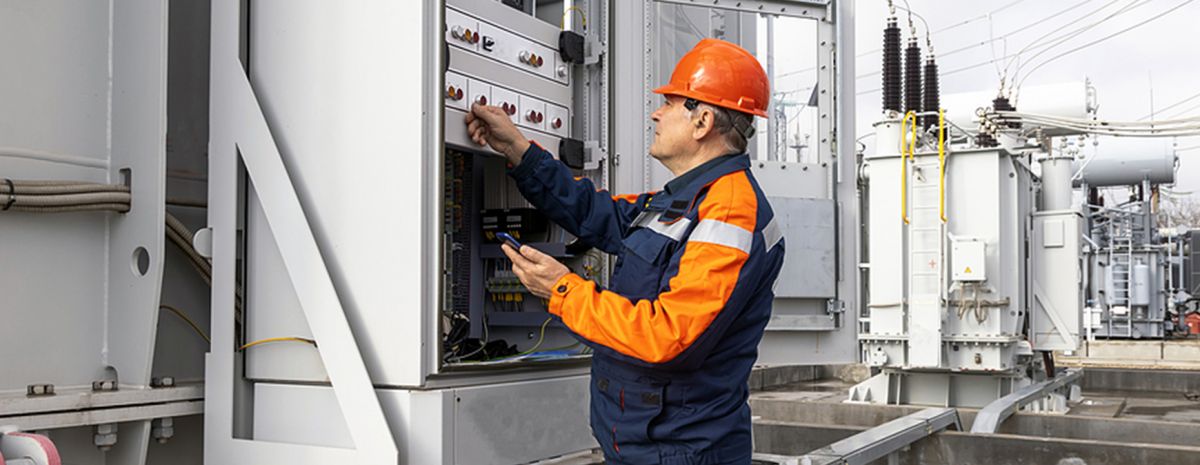RSI is a Great Training Option for Everyone
Learn more about how we can prepare you to advance your career.
If you are interested in working as a trade professional, one role that offers a competitive salary is that of powerplant field technician. After completing the Electrical Applications program at The Refrigeration School (RSI), you will be well prepared to start working as an apprentice powerplant field technician. First, let’s look at what a powerplant field technician does.
What Does a Powerplant Field Technician Do?
A powerplant field technician is responsible for installing, maintaining, repairing, and troubleshooting equipment and systems used in power generation facilities. They work on-site, often in powerplants, to ensure that machinery and equipment operate efficiently, safely, and in compliance with regulations.
Maintenance and Repairs
Powerplant technicians schedule and perform regular checks to prevent unexpected equipment failures. Tasks include lubricating moving parts, calibrating sensors, cleaning filters, and tightening connections. They may repair or replace damaged turbines, boilers, compressors, or auxiliary equipment. Part of their role is working on pumps, valves, bearings, seals, and other mechanical components to ensure they operate smoothly. Powerplant field technicians also inspect and repair electrical wiring, circuit breakers, and power distribution systems, ensuring safe and efficient power delivery.
Installation and Commissioning
Powerplant technicians set up new machinery such as turbines, generators, control panels, and monitoring systems in a power plant. They may upgrade older equipment to improve efficiency and compliance with regulations. They also conduct initial tests and maintain equipment to ensure all systems operate properly.
Troubleshooting
Powerplant field technicians use specialized tools like thermal imaging cameras, vibration analysis devices, or multimeters to pinpoint faults in equipment. They investigate recurring issues to identify underlying problems, such as material fatigue, electrical faults, or improper settings. They also handle equipment breakdowns or emergencies to restore operations quickly.
Get Started on the Path to a New Career
Fill out our form to learn how we can help you change your life.
Monitoring and Inspections
A powerplant field technician conducts scheduled inspections of critical systems, such as boilers, cooling systems, and electrical networks, to identify potential issues. They analyze data from control systems and sensors to monitor efficiency, energy output, and wear-and-tear trends. They may also physically inspect equipment for signs of leaks, corrosion, misalignment, or unusual noises.
Documentation and Reporting
A powerplant field technician keeps detailed records of repairs, replacements, and adjustments for compliance and future reference. They compile data on system performance, including power output, fuel consumption, and operational efficiency, and submit it to management. They also record safety checks and environmental monitoring to meet industry regulations.
Safety and Compliance
A powerplant field technician must follow workplace safety standards, including lockout/tagout (LOTO) procedures1, personal protective equipment (PPE) use, and hazard identification. They must be prepared to respond to powerplant emergencies, such as equipment malfunctions, fires, or power outages. This includes ensuring emissions, waste disposal, and water usage meet regulatory standards. They must also stay updated on the latest safety practices and train team members as needed.
How Much Do Powerplant Field Technicians Make?
The salary of a powerplant field technician in the United States varies based on factors such as experience, location, and the specific type of power plant. According to the U.S. Bureau of Labor Statistics (BLS)2, as of May 2023, the median annual wage for power plant operators, distributors, and dispatchers in the U.S. was $100,890.
Where Do Powerplant Field Technicians Work?
Powerplant field technicians operate in various work settings. Here’s a breakdown of the most common work environments:
Traditional Fossil Fuel Powerplants
Powerplants are typically large industrial facilities that generate electricity from coal, natural gas, or oil. They include boiler rooms, turbine halls, control rooms, and cooling tower areas. A powerplant field technician may endure high temperatures, loud machinery, and fossil fuel residues. Their responsibilities include monitoring combustion systems and turbines for efficiency, repairing and maintaining boilers, pumps, and heat exchange, and inspecting emissions control systems to comply with environmental regulations.
Nuclear Powerplants
Nuclear power plants are high-security facilities with strict safety protocols due to radiation risks. They have areas that include reactor cores, steam generators, cooling systems, and control rooms. The field technician may work in confined spaces, radiation monitoring zones, and advanced technology. As part of their role, they maintain and troubleshoot reactor support systems, such as coolant pumps or steam turbines. They may conduct inspections of radiation shielding and monitoring devices. They must work under strict regulatory and safety guidelines, including adherence to nuclear-specific certifications.
Solar Farms
Powerplant technicians work in expansive solar panel fields, often in sunny and remote areas. They work outdoors in high temperatures and intense sunlight. Part of their role includes inspecting and cleaning photovoltaic (PV) panels, repairing inverters, wiring, and mounting structures, monitoring energy output, and ensuring optimal alignment of solar panels.
Hydropower Plants
Hydropower plants are located near dams, rivers, or reservoirs, often in isolated or mountainous regions. Powerplant field technicians work in dam structures, turbine rooms, and water intakes. They maintain turbines, generators, and flow control systems, inspect and repair underwater structures and equipment, and monitor water flow and pressure to maximize power generation.
Want To Learn More?
If you want to learn more about becoming a powerplant field technician, The Refrigeration School has trade school programs that can equip you with the necessary skills and expertise. Call us today at (602) 607-0024 to learn more about our Electrical Applications program.




